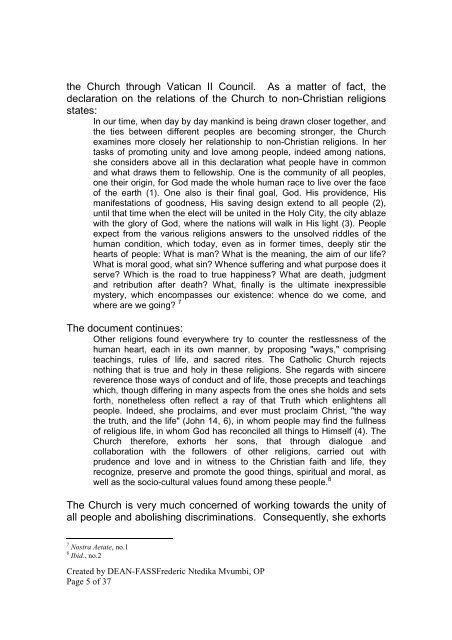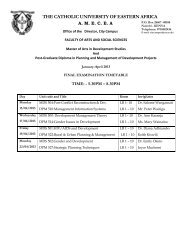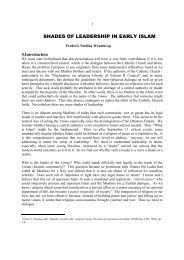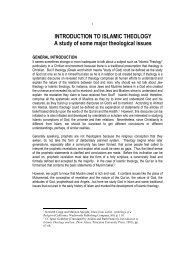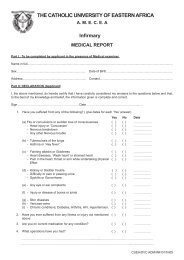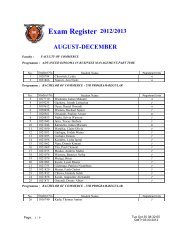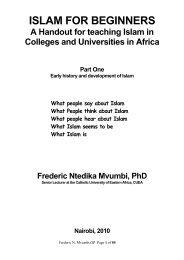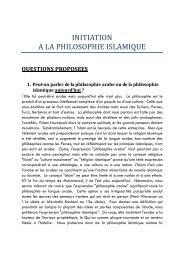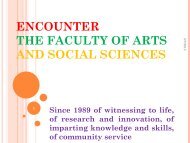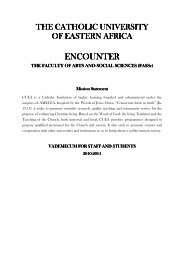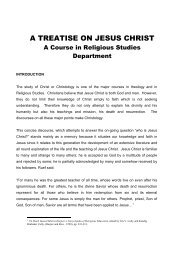PRINCIPLES FOR INTERRELIGIOUS DIALOGUE.pdf - CUEA
PRINCIPLES FOR INTERRELIGIOUS DIALOGUE.pdf - CUEA
PRINCIPLES FOR INTERRELIGIOUS DIALOGUE.pdf - CUEA
You also want an ePaper? Increase the reach of your titles
YUMPU automatically turns print PDFs into web optimized ePapers that Google loves.
the Church through Vatican II Council. As a matter of fact, the<br />
declaration on the relations of the Church to non-Christian religions<br />
states:<br />
In our time, when day by day mankind is being drawn closer together, and<br />
the ties between different peoples are becoming stronger, the Church<br />
examines more closely her relationship to non-Christian religions. In her<br />
tasks of promoting unity and love among people, indeed among nations,<br />
she considers above all in this declaration what people have in common<br />
and what draws them to fellowship. One is the community of all peoples,<br />
one their origin, for God made the whole human race to live over the face<br />
of the earth (1). One also is their final goal, God. His providence, His<br />
manifestations of goodness, His saving design extend to all people (2),<br />
until that time when the elect will be united in the Holy City, the city ablaze<br />
with the glory of God, where the nations will walk in His light (3). People<br />
expect from the various religions answers to the unsolved riddles of the<br />
human condition, which today, even as in former times, deeply stir the<br />
hearts of people: What is man? What is the meaning, the aim of our life?<br />
What is moral good, what sin? Whence suffering and what purpose does it<br />
serve? Which is the road to true happiness? What are death, judgment<br />
and retribution after death? What, finally is the ultimate inexpressible<br />
mystery, which encompasses our existence: whence do we come, and<br />
where are we going? 7<br />
The document continues:<br />
Other religions found everywhere try to counter the restlessness of the<br />
human heart, each in its own manner, by proposing "ways," comprising<br />
teachings, rules of life, and sacred rites. The Catholic Church rejects<br />
nothing that is true and holy in these religions. She regards with sincere<br />
reverence those ways of conduct and of life, those precepts and teachings<br />
which, though differing in many aspects from the ones she holds and sets<br />
forth, nonetheless often reflect a ray of that Truth which enlightens all<br />
people. Indeed, she proclaims, and ever must proclaim Christ, "the way<br />
the truth, and the life" (John 14, 6), in whom people may find the fullness<br />
of religious life, in whom God has reconciled all things to Himself (4). The<br />
Church therefore, exhorts her sons, that through dialogue and<br />
collaboration with the followers of other religions, carried out with<br />
prudence and love and in witness to the Christian faith and life, they<br />
recognize, preserve and promote the good things, spiritual and moral, as<br />
well as the socio-cultural values found among these people. 8<br />
The Church is very much concerned of working towards the unity of<br />
all people and abolishing discriminations. Consequently, she exhorts<br />
7 Nostra Aetate, no.1<br />
8 Ibid., no.2<br />
Created by DEAN-FASSFrederic Ntedika Mvumbi, OP<br />
Page 5 of 37


